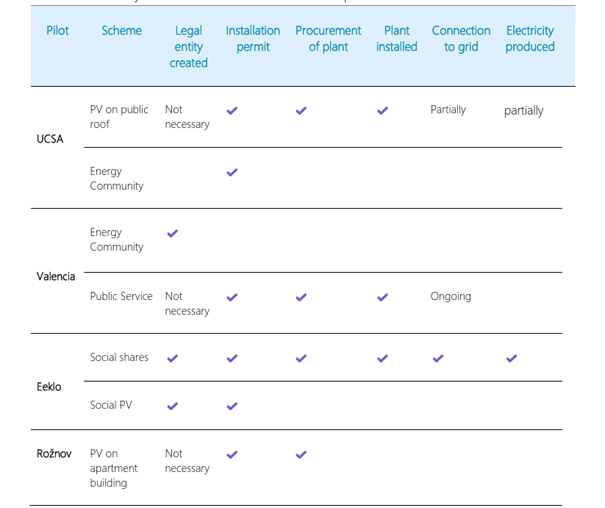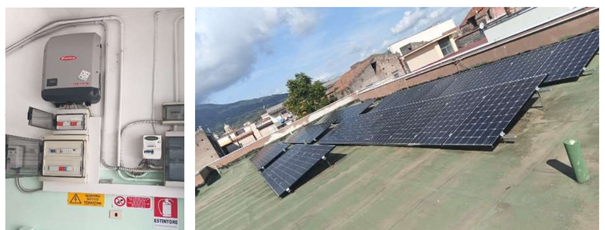Back in late 2021, four cities in Italy, Spain, Czech Republic and Belgium set off to produce renewable energy. Despite very different local contexts, they all had one same goal: sharing solar or wind energy with low-income households which usually wouldn’t afford it. As of day one social equity was built in each of the business models. Initial dreams turned into reality thanks to very pragmatic approaches.
From the idea to production, it took 20 months, meetings and a lot of flexibility to make it happen. This year, the first clean kilowatt hours finally started to flow in the cities of Eeklo (Belgium), Valencia (Spain), Roznov pod Radhostem (Czech Republic) and two smaller municipalities in Campania area (Italy). They mostly use municipal or cooperative assets to set up energy services that benefit vulnerable households either as direct energy (kWhs) or financially (Euros).
Technically, installations range from rooftop solar, ground-mounted arrays, cemetery PV to cooperative wind power. Across all sites, installations were selected not only for technical feasibility but also for their capacity to deliver fast, tangible benefits to vulnerable households—whether through shared generation, reduced bills, or building energy autonomy. Below is an overview of where each pilot stood in May 2025 after 20 months of preparation and implementation.

Despite all possible commitment, the journey was long and sometimes timelines slipped. This was often due to multiple municipal approvals, tender delays or instability in political leadership. Each site adapted. The Italian pilots, for example, focused resources on the quickest-to-install systems, including the modernisation and activation of existing PV assets. Same agility in Belgium: As energy market conditions changed, the Eeklo pilot had to adapt and extend its renewable energy offer: it added pre-financed solar plug&play to its municipally pre-financed social cooperative shares.

Tech combined with social
Besides the “logistics” of RES installations, municipal teams played the crucial role of enablers and facilitators for energy communities and energy efficiency actions. Each pilot embraced co‑creation as of the beginning: vulnerable households shaped schemes from the outset, defining governance and technical designs. Yet, getting these households involved remains the largest challenge—from outreach difficulties to legal, administrative, and trust barriers. Placing social workers or other local intermediary actors in lead roles proved effective but time-consuming.
The co-created schemes have then been refined through more detailed technical, legal and economic analysis.
The POWER UP municipalities had to learn and innovate their own ways of working. In Campania area, where the registration of an energy community is lengthy and expensive, the municipality managed to find the most appropriate status: the pilot created an association and develops a 441 kWp ground-mounted solar park on municipally owned land, confiscated from mafia activity, as a Renewable Energy Community (REC). Once operational, the energy community will create a monetary incentive that will be used to support families in energy poverty situations (it was estimated during the study phase that the energy produced could be shared with around 400 vulnerable families, with the benefit to be allocated to the families being estimated at 24,733.00 euro / year).

When administrative constraints appeared, pilots also found solutions through close collaboration between municipal departments and by regularly exchanging amongst each other. For some parts of the process, the city teams pioneered on procurement processes, adapting contracts with suppliers and customers along the legal requirements, creating legal entities, delivery of permits and authorisations.
Learning from the pragmatic forerunners
Finally, the POWER UP pilots offer a pragmatic roadmap for energy poverty action in Europe:
- Cooperative models (RECs and co‑ops) effectively democratise energy while delivering direct household benefits.
- Municipal leadership is key for activating local stakeholders and potentially influencing local procedures and policies in the long run
- Iterative rollout—start small, build trust, adapt to legal and operational constraints.
The geographically very diverse testbeds show: the journey toward clean, affordable and democratic energy takes time—but yields powerful social dividends.
📖 Useful resource for those who do not want to reinvent the wheel: A very recent report “Implementing renewables for social impact. An overview across 4 pilots” describes the implementation of these pilot schemes. It covers four main aspects for each pilot: the technical, legal, and governance aspects of the project, as well as the key challenges encountered during implementation. The diverse approaches and the lessons learned may be inspiring for other initiatives on renewable energy services for vulnerable people.
